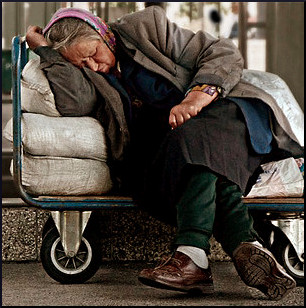
To speak of the crime of “Breathing While Homeless” is no joke any more—not that it ever was. In the late 1880s, singly and in groups, thousands of jobless, impoverished people roamed the countryside. The homeless wanderers were called tramps, and in Wisconsin Death Trip, Michael Lesy quotes a local newspaper’s report on what happened when 250 tramps approached the settlement. “They were marched to the river, made to wash themselves, given something to eat, and rushed out of town.” That can be looked at as an unconscionable violation of Americans’ rights, or as a relatively benign intervention.
On the other hand, what were the untold stories? Scores of people were herded to the river and—what? Made to strip down and wash their clothes by pounding them with rocks? Or were they forced to just wade into the river in what they wore, regardless of the ambient temperature, their state of health, the precious identity papers and photos they might have held onto…There is a lot we don’t know. At least the tramps were fed, but again, we don’t know exactly what that means.
Anyway, such an incident could provide opportunity for many kinds of abuse and even assault. It would not occur to the news editor to mention it, because everyone would assume it was business as usual. Nothing to see here, folks, so move on. Does our romanticized view of the country’s past throw a rosy glow over atrocities?
The point is that America has never rewarded those who just can’t make it. Adding insult to injury, the people who most despise the homeless are, often, the very ones who caused the dire and desperate financial conditions against which the rest of us struggle. Because the misery is so widespread, many journalists have done stories about its manifold aspects. In so many places it is either de jure or de facto illegal to sit, sleep, eat, or eliminate. But people have to do those things. This is the basis of the currently controversial Bell v. City of Boise legal case. A judge once said you can’t punish people for what people can’t help doing. The Justice Department, which appears to have sat mute on this question for a couple of decades, has decided to take an interest. Change may come. Only last month, Alan Pyke wrote:
Any community that makes homelessness illegal may soon find it harder to obtain Department of Housing and Urban Development (HUD) funding for building shelters and staffing outreach positions.
The criminalization of homelessness enriches certain industries and provides better employment opportunities for certain workers (like police and prison guards). For a person experiencing homelessness, every encounter with law enforcement is potentially lethal. When a community legislates against non-violent non-crimes like sitting on the sidewalk, the frequency of interaction goes up, and so does the fatality rate. Listen to what Allen Arthur said, also last month:
Nearly a third of those living in New York City homeless shelters are employed—at jobs that obviously don’t pay them enough to afford rent….Around 12 percent of homeless are veterans –their job deified when wartime profits call, but left for dead in the streets when their usefulness is exhausted…Both politically and economically, for the ruling class, the problem is more profitable than the solution.
Arthur has a great deal more to say, and does it clearly. He points out that 18 million housing units are empty in the United States. Some critics would wander off into the woods, arguing the exact amount of theoretically liveable space, or why it shouldn’t be lived in anyway. This writer breaks it down for us in terms of exactly who has benefited from the impoverished and homeless condition in which so many Americans find themselves. We can’t say “jobless” because today’s homeless and inadequately housed people are unlike those displaced people who entered and exited a Wisconsin town so long ago. Today, many of the people experiencing homelessness are working, and even working full-time. Richard R. Troxell of House the Homeless says:
For me, the issue is simple. If someone is prevented from pursuing a basic act of survival, then the fault lies with the entity that is disrupting the individual’s ability to survive unimpeded, be it another individual, a government, a system or a community.
Thanks to Richard and many, many other hard-working and highly-principled people, the city of Austin has been, in some areas, a pioneer. Please do visit “No Sit/No Lie: Troxell’s Testimony,” or one of our several other posts about this hot-button topic.
Reactions?
Source: “ Wisconsin Death Trip”
Source: “Local Officials Have Pushed To Criminalize Homelessness For Years. The Feds Are Starting To Push Back,” ThinkProgress.org, 08/18/15
Source: “Homelessness is the crime, not the homeless,” SocialistWorker.org, 08/09/15
Image by Christiaan Triebert


